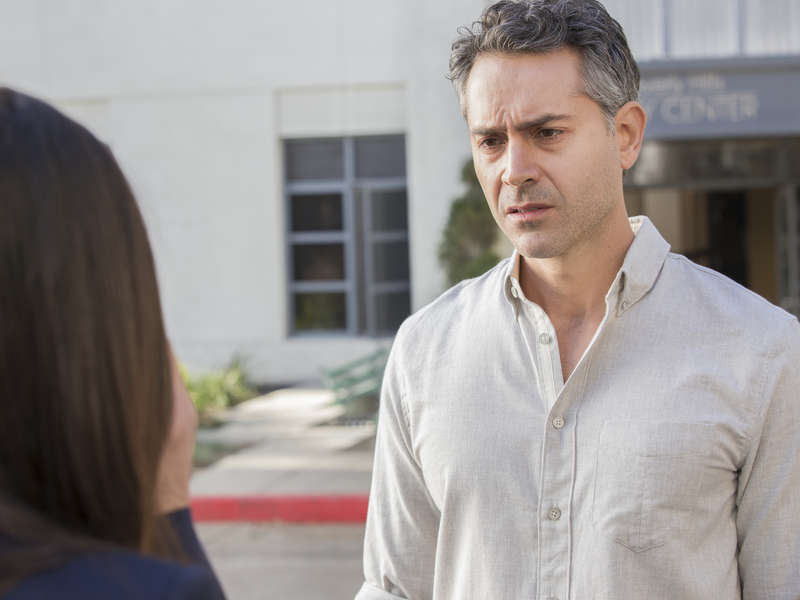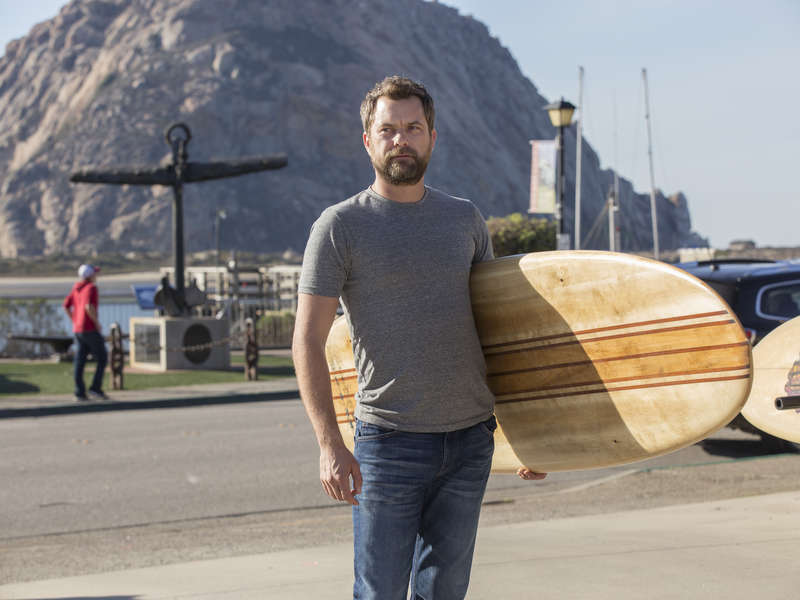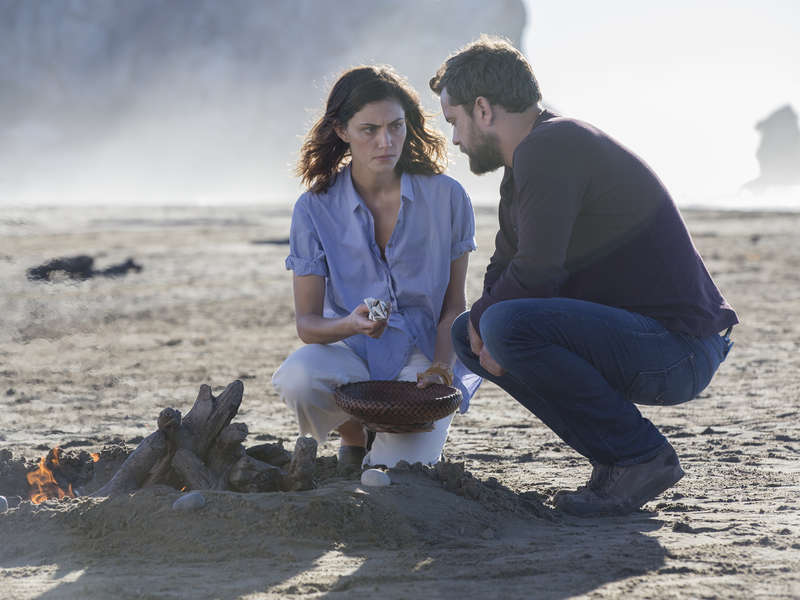“I’ve been the perfect immigrant son…Everything I’ve done has either been for or in reaction to them. I’m 45 years old. I’m at the top of my profession. I’m going to die. And I haven’t really made a single choice for myself.”
For a show built around the premise of adults behaving like impetuous children, there’s a surprising amount of parenting throughout. You could say that that theme — the glories of parenthood, and the sins as well — has loomed large over the entirety of The Affair, from the moment that it was revealed that Alison and Cole had lost their child; maybe even earlier, when we saw the Solloway clan heading for Montauk for the first time, watching Whitney and Martin’s rebellions or Stacey’s near-tragic choking incident in the Lobster Roll, or witnessed first hand how dysfunctional Helen’s parents were in their reactions to Whitney’s burgeoning womanhood. We’ve seen every one of these characters grapple with how to be a parent or how to avoid becoming like their own parents. It should surprise no one that this is where Season 4 would inevitably turn.
But surprise, it did, and I think it comes from the novel fact that it is Vik and Cole whose perspectives frame this episode. These are two men who have positioned themselves as the prototypical good guys: Vik was the doctor who saved Martin’s life and then selflessly filled the giant chasm in Helen’s life that Noah once occupied, while Cole is the ever-martyr who strives to make everyone else (the Lockhart clan, Luisa, Joanie, Alison…) happy at the expense of his own contentment. But behind the masks, these are men damaged by the sacrifices they’ve made, sacrifices that men make all the time for their loved ones but which rarely got explored with any sensitivity in media until recently. It doesn’t make their actions in this episode commendable, but it’s…refreshing, somehow, to watch how two underexplored characters dive into their pasts and wrestle with their demons.
(This is especially true of Vik. It feels so important to highlight his views as a person of colour and a child of immigrants, so much so that showrunner Sarah Treem gave a poignant shout out to tonight’s head writer, David Hwang, himself a person of colour. This is what representation looks like, and it’s why it matters.)
It’s a treat for me to work on this show and I’m very proud of it.
Vik’s parents are a mixed couple, so quite progressive in their own way. Yet as the son of immigrants, he still feels pressure, which @Omizzee brings so beautifully to life. https://t.co/tBLIVApKS0— David Hwang (@DavidHenryHwang) 16 July 2018
In “405”, we don’t get the now-familiar cold open with Noah, Cole, and Anton searching for Alison, but we do get a cold open — this time Vik and Helen, appearing joyful and jokey until Helen declines her fertility shot and urges Vik to leave for work instead. He heads out to his car, and is struck by pain; his wan complexion and sunken eyes belie his illness. Even in lighter moments, his diagnosis is ever-present.
Part One is from his perspective.
Vik’s parents own a dry cleaners, and this is where we find him, making a pit stop on his way to work to talk about his dad’s Prius, new diabetes testing, life insurance policies in the almost certain event of Vik’s death…you know, the usual. It’s a dark conversation, and set amongst racks of plastic-bagged clothing whizzing by on conveyor belts, it takes on an almost surreal quality. But cold reality hits home when Vik’s mother refuses to continue the conversation, and his father chastises him for his cruelty. Vik is their only son; he has to fight, and he has to live. For once, even though they don’t like one another, it seems that Priya and Helen are on the same page in urging Vik to seek treatment.
Of course Vik is in paediatrics, and so his job consists of having the conversations that his doctor had with him, presumably, following his diagnosis, except he has to have it with parents of children instead. We see one of these conversations in “405” — a mother apoplectic at the hardships befalling her family, a father trying to hold it together, Vik and his rote speech about how this isn’t the end of the road and there are “next steps” that can be taken. The venomous way in which the mother spits the word “cancer” is such a stinging rebuke to Vik and his choice to forgo treatment that he almost looks wounded; the thing inside him is so abhorrent it makes people lose their minds, and even though it’s eating him alive he won’t or can’t do a thing about it.
The camera spends a lot of time zoomed in on Omar Metwally’s face this episode, and while I’m biased in the sense that I don’t think that could ever be a bad choice (“Paging Dr. Hot Doctor…”) I’m also certain it was the right one because so much is going on behind his eyes; Metwally is amazing in every scene, and he imbues Vik with so much depth often with nothing more than a quirk of an eyebrow. It’s hard to tell if Vik believes that there are actually next steps or not; I’m guessing not, since he’s talked about this before, and in a later scene he hears the same from Helen’s fertility doctor and it presages the unwelcome news that Helen’s treatments aren’t working. If so, Vik knows his words are hollow, even if they are true, but he can’t help but say them in order to spare the poor girl’s parents, even if he can’t afford himself and his loved ones the same luxury. There’s no room for emotion. Either way, it’s all cold facts delivered without comfort. For the first time, it seems as though Vik’s resolve fades, and he doubts that he’s doing the right thing.

Of course Helen’s treatments aren’t working because she’s stopped giving herself injections, and for once I found myself agreeing with her: she can’t raise a baby on her own and it’s selfish for Vik to insist she do this (and not even for him, but for his parents with whom Helen doesn’t get along). Of course Vik sees only the fact that she lied to him, and in his anger he paints Helen differently than any previous incarnation of Helen we’ve seen to date, and I wonder if Vik’s perspective of her is why I agreed with her. Does seeing Helen through Vik’s eyes help us see her the way he says he’s always seen her — as tough and unerring and sure of herself — instead of the way she sees herself, or how Noah or Alison see her?
In any case, Vik’s Noah Solloway-esque path to self-destruction opens up and we see him finally taking control and doing what he wants to do. But he’s not Noah Solloway, and while we should be grateful that he isn’t, a part of me feels terrifically sad to see him defeated at the end of the night, standing paralysed in the driveway outside his home. You can feel the weight of his decisions on him, oppressive like the darkness that surrounds him. He’s not lived his life for himself, and he’s at the end of it already. Alone, crushed by the revelations of the day, he’s suddenly very small.
You have to wonder if this will lead him to choose life on his own terms. If that means treatments and a family with Helen, treatments and a life without the Solloways, still no treatments at all, or something else entirely, I want that for him.
Will he get that?
I’m not holding my breath. Yet.

Cole’s dad’s surfboard is the impetus for Cole’s walkabout, which seems to end as quickly in this episode as it began last episode. In Morro Bay, he discovers that the board’s shaper is someone with whom his father carried on a torrid love affair for more than ten years, from Gabriel Lockhart’s walkabout until weeks before his death when Cole was ten.
Nan (Amy Irving) is lovely, the kind of aging hippie that Diane Keaton has played for the last 30 years, someone whose stories you listen to but whose advice inevitably involves some modern, New Age-modulated variation of turning on, tuning in, and dropping out, so you chalk them up to a curiosity and nothing more. This is how Cole seems to start his relationship with Nan — his wound up East Coast sensibilities stand in stark contrast to her hippie-dippy West Coast ideals — but he relents and is taken over by the charms she puts in front of him: salons with her artistic friends, apparently potent weed, and the offers of sex with her protege, Delphine (Phoebe Tonkin).
I viewed Nan and Delphine — Nan, a name which derives from Hannah and references a Biblical prophetess; Delphine, which obviously references Delphi, a city considered the navel or womb of the world, and also the famous Greek oracle through whom Apollo spoke — through a kind of magic realist light, and the mystical turn this episode takes is the kind of story that could only happen on a California walkabout. I buy it only in this light — Cole is searching, desperate, and just like there are no atheists in foxholes, when backed into a corner like this, Cole takes the path that’s offered him. His attempted exorcism of Alison from his life has all the trappings of a magic spell and doesn’t fit with the ethos of this show (except insofar as Alison previously admitted to believing in premonitions, which may or may not be the same thing). Of course the spell is not going to work, but in this place, with these women, Cole can’t help but believe in it.

“I don’t want to wake up in ten years and want to kill myself ’cause I was just trying to do the right thing.”
But for all their otherworldly machinations, the wounds of the past — of Nan’s relationship with Gabriel — are never far from the surface and both Cole and Nan learn things about this mystery man who violently left them both thirty years earlier. It wasn’t Gabriel at all who sent back the letters; the spell didn’t work then, just as it didn’t work now. What’s worse, Nan’s final letter to Gabriel predated his suicide by mere weeks. Did he take his life because of Nan? She thinks so, and maybe Cole does too. Very mortal and earthbound concerns have wound these two around Gabriel’s final act, and around each other; all supernatural subtext dissipates like mist after sunrise.
More importantly, in the cold light of day, Cole achieves the clarity he sought. In his decision to go home, but not to Luisa — he won’t make the same mistake as his father, turning his back on love in order to hold onto this nebulous “right thing” that he keeps striving for — he’s very likely ruined Luisa’s life, and for what? He’s not even sure Alison feels the same way. But he’s charging ahead anyway, for better or worse.
I cried while watching this episode last night, struck by the power of Vik’s emotional breakdown and Cole’s passion (kudos, again, to Joshua Jackson, who soars). But my own realisation in the cold light of day is that I’m not sure the selfish decisions Vik and Cole both make were necessary to reach their respective conclusions. Sure, it’s dramatically satisfying and heightens tensions. For Vik, I feel this was a lapse in judgment that we know he’s going to regret, and what happens next will tell us if he’s vindicated or not. Cole is trickier. At the end of his half of the episode, while looking out over the ocean, he thanks his dad. There’s a closure there I wasn’t expecting, and certainly wasn’t expecting to happen so quickly. It’s something Cole has never given Cherry, and which seems strange to give to his father — a man he hated for so long but now, two days later, he suddenly understands? It’s a momentous decision that will have far-reaching effects on people who have no say in the matter, and in many ways this is not a rebellion against his father’s choices so much as it is a continuation. I’m not sure there’s much dignity in that.
For what it’s worth, I feel like Cole and Vik’s stories still mirror so many of our own. Don’t we all make decisions for and in reaction to our parents? Aren’t we all blind to the lives our parents had before they were our parents? There’s a reckoning each child has to go through, where they either accept the role their parents had or didn’t have in their life or don’t. Vik and Cole are at that point. It remains to be seen if it lasts, and how it will affect those in their orbits.
Post Script
- That incredible highway to Malibu? Can confirm — it’s one of the most enchanting drives I’ve ever taken, hands down.
- Did we know that Gabriel Lockhart died by suicide?
- I’m going to find a way to incorporate the delicious Yiddish word b’shert (soulmate) into one conversation a day for the next week.
- Convenient that both Vik and Cole have willing, nubile young women at their beck and call for the moment when they most need absolution. Of course, we need to remember that the show doesn’t condone these choices, only presents them as what they are — the subjective experiences of flawed men. What they do with their flaws, how the reckon with them and either rise above or sink again is what matters. It’s ultimately how the other characters see them that will make all the difference, and I still applaud The Affair for being one of the only shows on television to render these things as murky as they are. In being so subjective about it, it’s one of the truest explorations of the mess that is “life” that I’ve ever seen.
- Absolutely incredible choice to score Cole’s exorcism of Alison with Lord Huron’s “The Night We Met” and his leaving the next morning with The National’s “About Today”…I can’t recall a popular song being used in The Affair this season or last, but even if it has been done, it’s not been overdone, and that’s what makes it so striking now.


I was stunned into silent reflection by the Cole episode. Most powerful TV segment ever…
It literally made me cry. Very powerful for so many reasons.
Yes, I had that reaction too…
Same for me. I immediately got onto the internet after I finished crying and was stunned to see that several sites (that I’ll never visit again) gave it a bad review. I thought it was, without question, one of the best episodes of the series.
Just watched this morning. The Cole story was the best I’ve seen this season. Also, I’m dealing with my broken hearted son (21) whose girlfriend just left to go back to her own country because of an attempted suicide (over anxiety and depression). The Night We Met playing during the episode has me in tears and thinking of the pain of young love. Love that probably will haunt my son all his life.
I’m so sorry to hear of your son’s heartbreak. It’s true that love like that impacts us very strongly and leaves deep impressions for life. Hopefully he comes out wiser and stronger in the end. <3